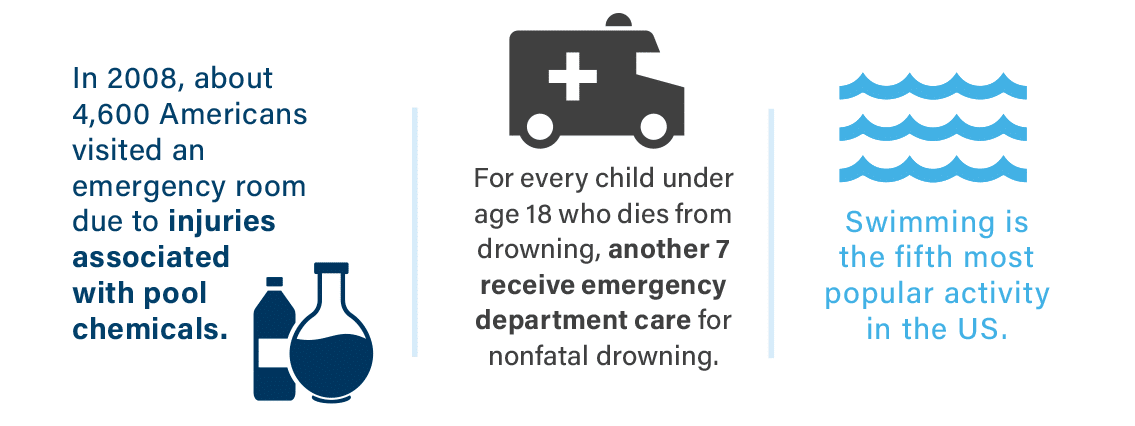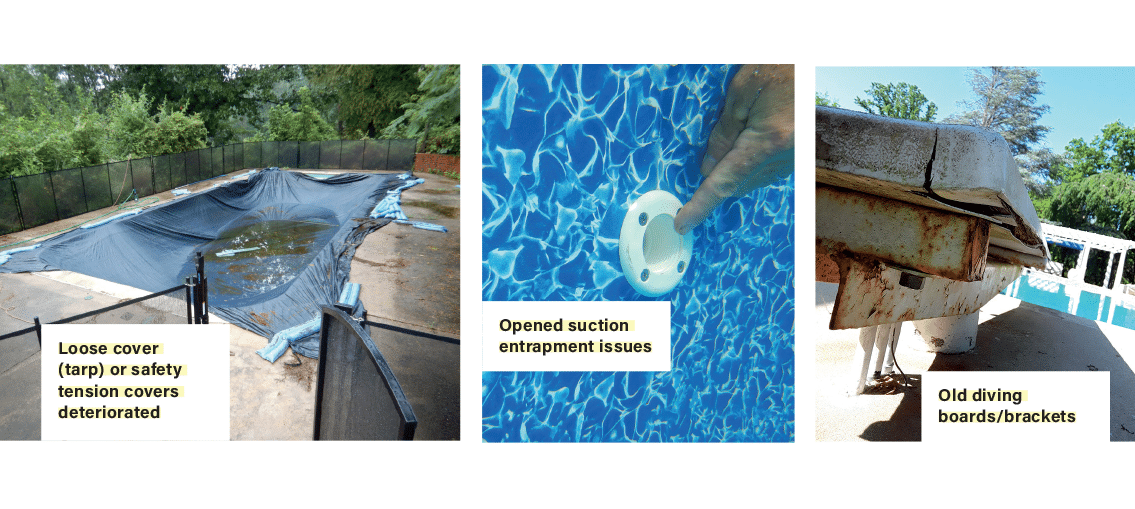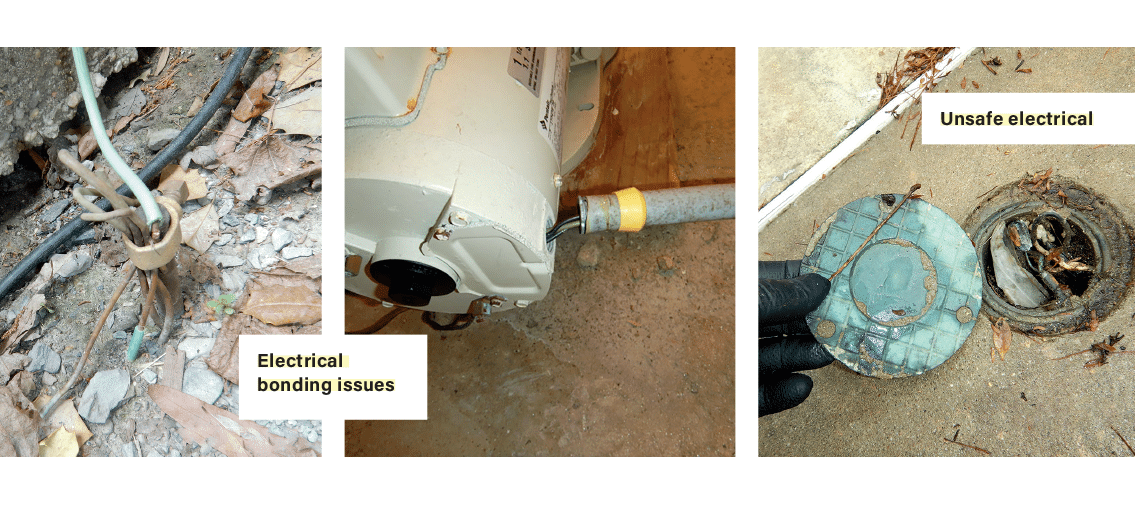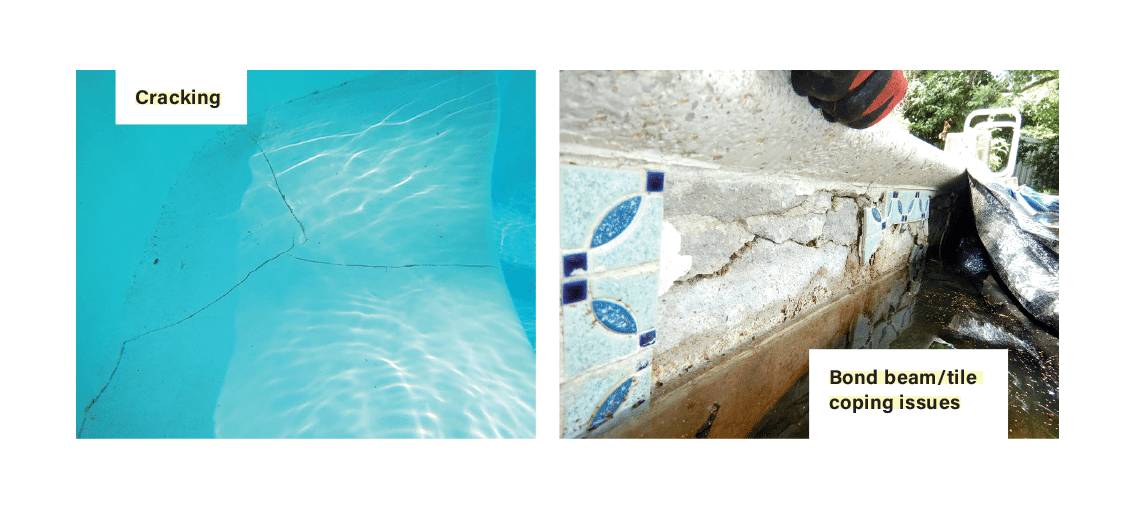Bringing Out Your Inner Pool Inspector

I jumped into the pool Inspection business about 15 years ago, recognizing the lack of qualified service providers in my area. Real estate agents would often ask, “Can you take a peek at the pool for us?” or say, “I’ve never sold a house with a pool before so I’m not sure what to do.” Buyers were equally clueless and figured the pool was outside the scope of any inspections. Often, the pool went unchecked. Surely the new owners regretted that decision.
The Need
“Pools are rare, right?” I hear that all the time. Statistics suggest there are more than 10 million residential swimming pools in the US. While most may be in more balmy regions than my service territory, that’s still a lot of pools. Just Google your area to see how many homes have pools hiding in the backyard.
Beyond the business opportunity, the need for this service is so important when you look at the statistics (as reported from the CDC, WHO, and US Bureau of Labor Statistics).


Safety issues (and the related liability) are first and foremost when it comes to most inspections, and that’s especially true with pools. The statistics mentioned above are a chilling reminder. When I talk to other home inspectors that is often the reason they don’t want to get involved in pools. As we know, risk can be mitigated through agreements, use of SoP & CoE, insurances, quality inspection and reporting practices, and professional customer care, but exposure is always there.
Getting Up to Speed
Looking back, did I know everything I needed to know to make this transition? The short answer is no. However, at the time, I had more than 15 years experience as an inspector, performing primarily residential and commercial inspections. This foundation made entering pooI inspections easier. However, having never built a pool or worked a service route, the learning curve is challenging.
Today, with more than 30 years of experience as an inspector, I still don’t claim to know it all. The reality is—just like any structure or set of systems—things are always changing, and a good inspector never stops seeking education.
ASHI has some great pool Inspection guidelines, information, and training. I stick to the ASHI Code of Ethics (CoE), and I use the ASHI Standards of Practice (SoP) as my stated standards, although I exceed them in areas.
To become more proficient as a pool inspector, I have aligned myself with the Pool & Hot Tub Alliance (PHTA). Attending their annual expo allows for great learning and hands-on evaluation of pool products and systems. I have obtained many pool industry credentials well beyond the “Certified Pool Inspector,” which is not enough in my opinion.
In recent years I began presenting educational classes for PHTA at national pool industry expos in Las Vegas, Houston, and Atlantic City—kind of like InspectionWorld for pools—teaching pool contractors what it takes to perform a pool inspection. In my experience, most pool contractors want nothing to do with pool inspections—especially once they hear what is involved. When I mention E&O insurance, agreements, and report production, a few attendees get up and leave the room. Many pool contractors want to “get into it to get the repairs,” so when I mention the fact that ethically they cannot work on a pool they inspect for one year, several more attendees get up and walk out. That’s good for us.
I honestly believe home inspectors are in the best position to perform pool inspections, and ASHI is well suited to raise awareness for the professional pool inspection industry.
Common Issues
We have all heard this question: “What do you typically find during your inspection?” Pools are no different. There are the typical and common concerns that make just about every report and, of course, as with any system, some issues make you shake your head.
Let’s look at some of the common issues in my area:



- Site Issues: Patio/Surround Cracked/Uneven, Site Drainage Issues, Remote Pool Location/Limited Ability to Monitor, Neighboring Pools, Pool Constructed in Disturbed Earth or Terraced Settings
- Barrier/Fence/Cover Issues:Fence Design/Height or Spacing Issues, Shared Fences, Gate Swing and or Closure, Latch Misaligned or Too Low, Direct Access to Pool from Home, Loose Cover (Tarp) or Safety Tension Covers Deteriorated, Tension Cover Attachment Issues
- Diving/Depth Issues: Old Diving Boards/Brackets, Diving Envelope Concerns, Shallow Pool Areas, Raised Pool Edge Areas
- Railing/Ladder/Egress Issues:Missing Ladder/Railing, Damaged Mounting Sockets, Ladder Entrapment Issues, Improper Deep Water Egress Provisions or Means of Rest
- Rim/Shell Issues: Tile Failures, Coping Failures, Bond Beam Failures, Pool Shell Finish Failures, Liner Failures, Structural Cracks, Shell Shifting or “Pool Pops”, Water Loss, Hydrostatic Relief Fitting Issues
- Electrical Issues: Rust/Corrosion in Panel/Breakers, Lack of GFI Protection, Incomplete Bonding, Exposed Splices, Control Panel Issues, Below Water Lighting Inoperable
- Pumps/Plumbing Issues: Circulation Restrictions, Leaks, Valve Failures, DWV Pipe/Fittings used in Pressure Application, Entrapment Hazards/Suction Outlet Fitting Issues
- Heater Issues: Rust/Corrosion, Debris/Nest Materials or Animals Within, Control Panel Failure, Flow Switch Issues, Lack of Pressure Relief
- Filter System Issues: Internals/Grids Damaged, Filter Housing Worn (Exposed Fiberglass), Band Clamp Leaks, Skimmer or Pump Filter Baskets Damaged, Weir Door Missing, Improper Backwash Discharge
- Miscellaneous Issues: Safety/Warning Labels Missing on Equipment, Altered or Abandoned Equipment, Temporary Installations, Encroachments Issues like Vegetation, Loose/Unstable Materials (especially at waterfall features), Cleaning System Issues, Automation Issues
Client Value
My experience tells me, in many cases, the issues that become known through the course of a pool inspection will outweigh dollar-wise and safety-wise those found during the home inspection. It’s also clear that, when times are tight, the pool is often the last place homeowners spend money. Owning a pool is like any other luxury item, like a boat, let’s say. We’ve all heard B-O-A-T = Break Out Another Thousand. Pool inspections during a real estate transaction will be one of the best investments a buyer can make. It may even save a life.
Most buyers I meet are first-time pool owners. It makes sense, as a buyer who owned a pool at their last house is most likely not looking for another home with a pool (it may be one of the reasons they are moving). Educating a buyer on the conditions and systems of a pool is important to give them a sense of comfort and ability to manage this new responsibility. Keeping everything in perspective is key; recognizing and stressing the importance of the inherent safety issues is paramount.
Doing the Work
In geographical areas where seasonal pool operation is the norm, inspectors should be prepared to work year-round. This means being willing to remove and reinstall pool covers on winterized pools, clear off snow, blow back leaves, and brave the sometimes frigid winter winds to perform a professional inspection. Occasionally I will duck into the house to check this or that while I warm up.
Understand: A professional pool inspection typically takes 1.5 to 2.5 hours. A word of caution here—it makes for a long day if you are on the house for 3 hours or so and then need to venture out to the pool. These days I’m happy to just inspect the pool!
Just as with home inspections, the use of certain gear to inspect a pool has become the norm. Specialty tools in my rig include underwater camera(s), water “loss” (leak detection) equipment, motion-based measuring equipment, and a few tools for cover removal/reinstallation. Otherwise, the tools gathered during my home inspection career round out my needs.
The next time you are on an inspection and see that pool back there, think about whether you could be the next professional pool inspector in your area.
Opinions of authors are solely their own and do not necessarily represent the opinions or positions of ASHI, its agents, or editors. Always check with your local governmental agency and independently verify for accuracy, completeness, and reliability.
To Read the Full Article
ASHI offers its members unparalleled resources to advance their careers. ASHI offers training for inspectors at all levels of knowledge and experience, including resources about all major home systems. Members benefit from a vast network of experienced professionals, providing a community for mentorship and knowledge sharing..
In this Issue
Managing Risk: Processing Insurance Claims
4 Tips for Respecting Copyrights
Check the Deck
Leading the Industry
Dealing with Stress
Examination Board of Professional Home Inspectors Study
Postcards from the Field

FIND A HOME
INSPECTOR
Professional Networking
Grow your professional network, find a mentor, network with the best, and best part of the community that’s making home inspection better every day.
